Some iconic Disney characters aren’t a part of the official princess lineup — but they’re still worthy of being your daughter’s namesake.
Boy names that start with F might be forgotten in today’s society — but it hasn’t always been that way.
In fact, the letter “f” was once the seventh-most popular first initial in the United States in the late-1800s and remained a top-10 first initial all the way until 1920, according to Behind the Name.
But as time went on, parents started avoiding F names for boys at all costs.
The letter “f” eventually fell out of the top-15 in 1944 and later dropped out of the top-20 in 1993 before settling as the 21st (out of 26) most popular first initial — where it has been every year since 2002.

Now, this is where things get interesting and, quite frankly, a little shocking.
In 1887, when the letter “f” peaked at seventh on that list, five names (Frank, Fred, Frederick, Francis and Floyd) each ranked in the Social Security Administration’s (SSA) top-100 most popular boy names.
Fast forward to 2024 and not a single boy name that starts with F cracked the top-150, per the SSA.
In fact, not a single boy name in the top-150 included the letter “f” anywhere in the name.
RELATED: Celebrity baby names that prove great minds think alike when it comes to their children
According to the SSA, the most popular boy names starting with F in 2024 were Felix (177th), Finn (198th), Finley (290th), Francisco (307th), Fernando (352nd) and Franklin (385th).
Here are some other F boy names that aren’t popular but are worth adding to your baby name list!
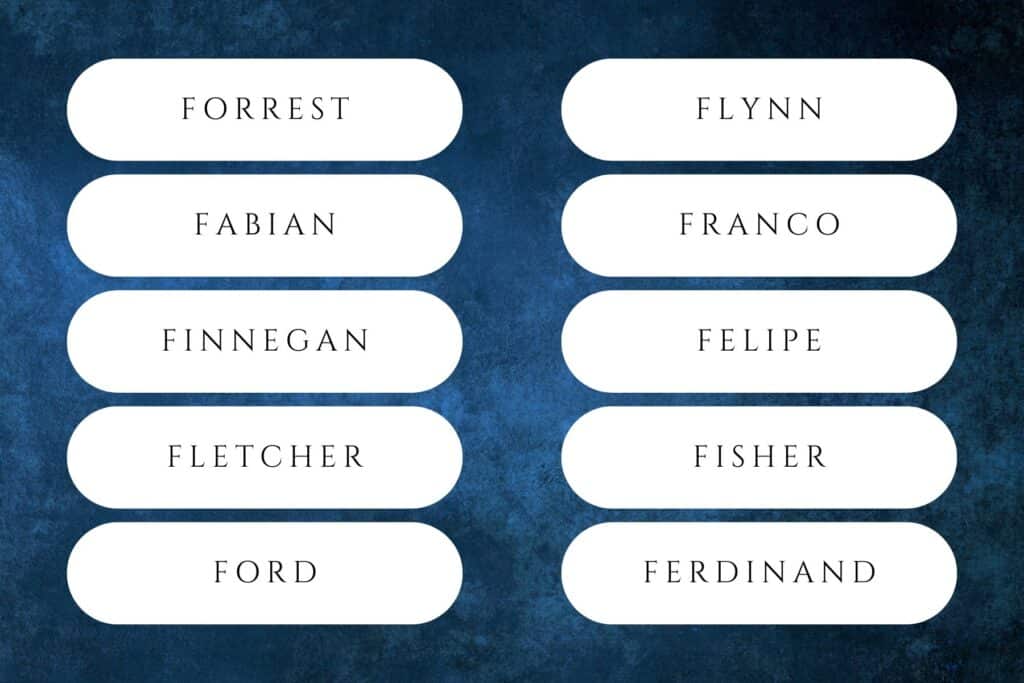
Forrest
Origin: English; Old French
Meaning: Large area covered with trees
Forrest, pronounced FOR-est, comes directly from the English word forest and Old French word forest, referring to a large area covered with trees. It was traditionally given to someone who lived or worked in a forest.
Fabian
Origin: Roman; Latin
Meaning: Bean
Fabian, pronounced FAY-bee-ihn, comes from the Roman names Fabianus and Fabius, which derive from the Latin word faba, meaning “bean.” Fabio is the Italian and Spanish form, while Fabia is the feminine form.
Finnegan
Origin: Irish
Meaning: White; Blessed
Finnegan, pronounced FIN-ih-gin, is the Anglicized form of the Irish given name Fionnagán, which is a diminutive of Fionn and ultimately derives from the Old Irish word finn, meaning “white” or “blessed.”
Fletcher
Origin: Old French
Meaning: Maker of arrows
Fletcher, pronounced FLET-chur, comes from a Middle English surname derived from the Old French word flechier, meaning “maker of arrows.” It’s a unique twist on popular names like Arrow and Archer.
Ford
Origin: Old English
Meaning: River crossing
Ford, pronounced FORD, comes from the English word ford (derived from Old English ford), referring to a shallow place in a river or stream allowing one to walk or drive across. It can also refer to the vehicle.
Flynn
Origin: Old Irish
Meaning: Blood red
Flynn, pronounced FLIN, is the Anglicized form of the Irish given name Floinn, which is a diminutive of Flann and comes from the Old Irish word flann, meaning “blood red.” It was the name of a 9th century Irish king.
Franco
Origin: Italian
Meaning: Freeman; Frenchman; Germanic tribesman
Franco, pronounced FRENK-oh, is the Italian form of Frank, referring to the Germanic tribe known as the Franks, or a diminutive of Franklin, meaning “freeman” or Francesco, the Italian form of Francis meaning “Frenchman.”
Felipe
Origin: Spanish; Portuguese; Greek
Meaning: Friend of horses
Felipe, pronounced fuh-LEE-pay, is the Spanish and Portuguese form of Philip, which comes from the Greek name Philippos and is composed of the elements philos, meaning “friend,” and hippos, meaning “horse.”
Fisher
Origin: English
Meaning: Fisherman
Fisher, pronounced FISH-er, originated as a surname given to a fisherman or someone who works with fish. It wasn’t popular as a given name until the early 2000s, but has regularly cracked the top-100 since.
Ferdinand
Origin: Latin; Gothic
Meaning: Daring peace; Brave journey
Ferdinand, pronounced FUR-dih-nand, comes from the Latin name Fredenandus, which is composed of the Gothic elements friþus, meaning “peace,” or farþa, meaning “journey,” and nanþa, meaning “daring.”
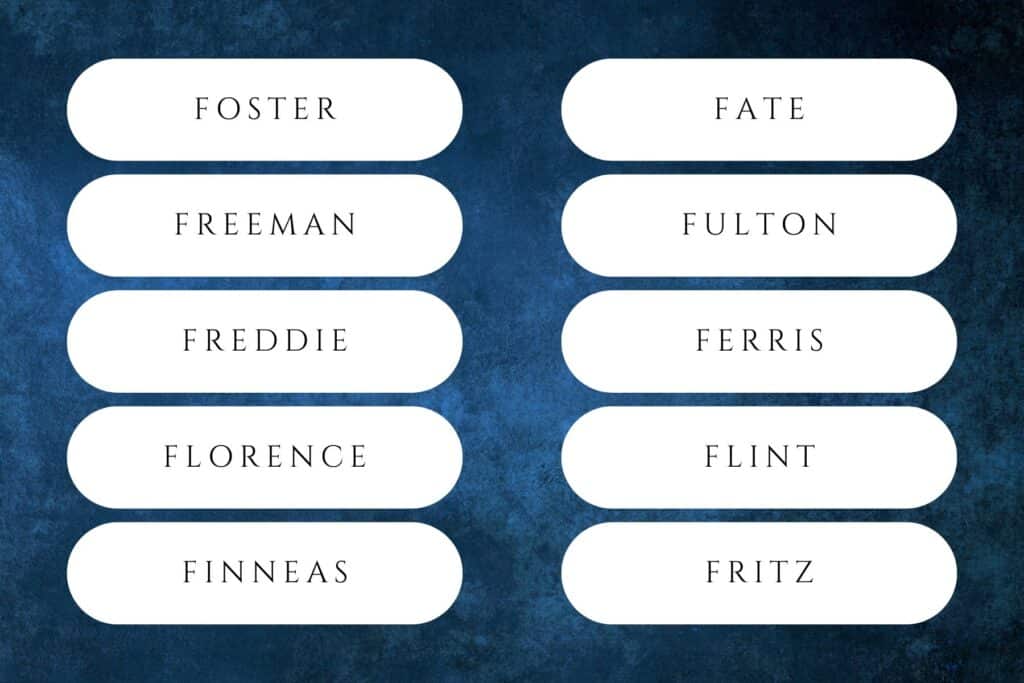
Foster
Origin: English
Meaning: Scissor maker; Saddle tree maker; Forest
Foster, pronounced FAH-stir, originated as an English surname given to someone who made scissors (via Old French forcetier), made saddle trees (via Old French fustier), or lived in a forest (via Old French forest).
Freeman
Origin: English
Meaning: Free man
Freeman, pronounced FREE-mihn, originated as an English surname that was quite literally given to someone who was considered a “free man.” It stopped being popular as a given name in the 1970s.
Freddie
Origin: Old German
Meaning: Peaceful ruler; Peace to the king
Freddie, pronounced FRED-ee, is a variant of Freddy and diminutive of the German name Frederick, which is composed of the Old German elements fridu, meaning “peace,” and rih, meaning “ruler” or “king.”
Florence
Origin: Latin
Meaning: Flourishing; Blossoming
Florence, pronounced FLOR-ints, comes from the Latin name Florentius and Florentia, which derive from the Latin word florens, meaning “flourishing” or “blossoming.” It’s also the name of a major city in Italy.
Finneas
Origin: Hebrew; Old Irish
Meaning: Serpent’s mouth
Finneas, pronounced FIH-nee-ihs or FIH-nee-us, is a variant of Phineas, which is believed to mean “serpent’s mouth” in Hebrew. The spelling could be inspired by the Old Irish word finn, meaning “white.”
Fate
Origin: English; French; Latin
Meaning: Fate; Destiny
Fate, pronounced FAYT, comes directly from the English word fate, which derives from the Old French word fate and Latin word fata. In English, fate refers to “something that was destined to happen.”
Fulton
Origin: Old English
Meaning: Bird hill
Fulton, pronounced FUL-tihn or FUL-tun, originated as a surname inspired by the Norfolk town of Foulden, which is believed to mean “bird hill” in Old English. There’s a town named Fulton in Missouri.
Ferris
Origin: Old Irish
Meaning: Man of vigor; Strong man
Ferris, pronounced FAIR-ihs, is believed to be a diminutive of the Irish name Fergus (spelled Fearghas), which comes from the Old Irish elements fer, meaning “man,” and guss, meaning “vigor” or “strength.”
Flint
Origin: English
Meaning: Rock known for producing sparks
Flint, pronounced FLINT, comes directly from the English word flint, referring to the type of rock commonly used in creating fire. Flint embodies the warmth that becomes so precious as temperatures begin to drop.
Fritz
Origin: German
Meaning: Peaceful ruler
Fritz, pronounced FRITZ, is a German diminutive of Friedrich and Frederick, which is composed of the Old German elements fridu, meaning “peace,” and rih, meaning “ruler” or “king.” Taylor Fritz is a popular American tennis player.
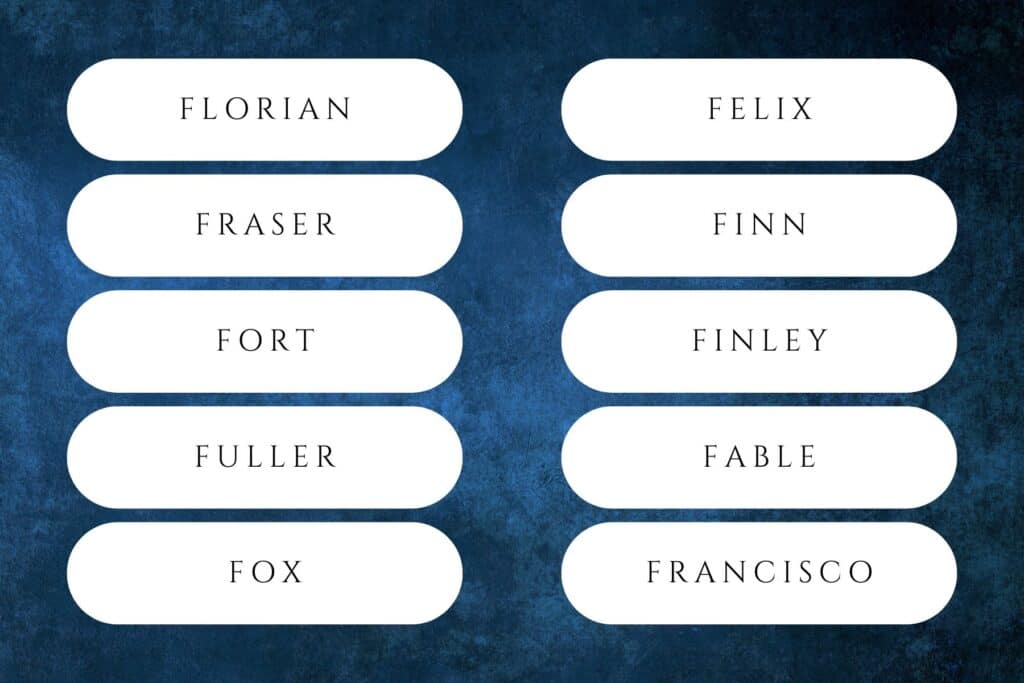
Florian
Origin: Roman; Latin
Meaning: Flower
Florian, pronounced FLOR-ee-ihn, comes from the Roman name Florus and is derived from the Latin word flos or floris, meaning “flower.” It’s similar to Florence and has a feminine form, which is Floriana.
Fraser
Origin: French
Meaning: Strawberry
Fraser, pronounced FRAY-zhur or FRAY-zhuh, is believed to come from the French word fraise, meaning “strawberry.” It can also be a variant of Frasier, as in Kelsey Grammer’s character’s name in “Frasier.”
Fort
Origin: English; French
Meaning: Fortress; Strong man
Fort, pronounced FORT, comes directly from the English word fort, which derives from the French word fort, meaning “fortress” or “strong man.” It can also be a diminutive of fortune or the name Fortunato.
Fuller
Origin: English; Latin
Meaning: Fuller; Laundry worker
Fuller, pronounced FUL-er, originated as a surname given to a fuller, which was a person who thickened and cleaned coarse cloth by pounding it. It comes from the Latin word fullo, meaning “laundry worker.”
Fox
Origin: Old English
Meaning: Clever; Cunning; Dog-like mammal
Fox, pronounced FOKS, comes directly from the name of the animal (derived from Old English fox), known for being clever and cunning. Other names that mean fox include Fuchsia, Todd, Criofan and Foxy.
Felix
Origin: Latin; Roman
Meaning: Lucky; Successful
Felix, pronounced FEE-lix, comes from a Roman cognomen that means “lucky” or “successful” in Latin. In the New Testament, Felix was a freed slave and Roman governor of Judea who imprisoned Saint Paul.
Finn
Origin: Old Irish
Meaning: White; Blessed
Finn, pronounced FIN, is the Old Irish form of Fionn, which comes from the Old Irish word finn, meaning “white” or “blessed.” Fionn (Finn) mac Cumhaill is one of the most legendary heroes in Irish mythology.
Finley
Origin: Old Irish
Meaning: Blessed warrior; Fair warrior
Finley, pronounced FIN-lee, is a variant of Finlay and, ultimately, Fionnlagh or Findláech, which is composed of the Old Irish elements finn, meaning “white” or “blessed,” and láech, meaning “warrior.”
Fable
Origin: English; French; Latin
Meaning: Fictitious; Moral-driven story
Fable, pronounced FAY-buhl, comes directly from the English word fable (from Old French fable and Latin fabula), meaning “fictitious” or “a short, fictional story that typically features animals and a moral lesson.“
Francisco
Origin: Spanish; Latin
Meaning: Frenchman
Francisco, pronounced FRAN-siss-koh, is the Spanish and Portuguese form of Franciscus (Francis), which means “Frenchman” in Latin and is ultimately derived from the Germanic tribe of the Franks.
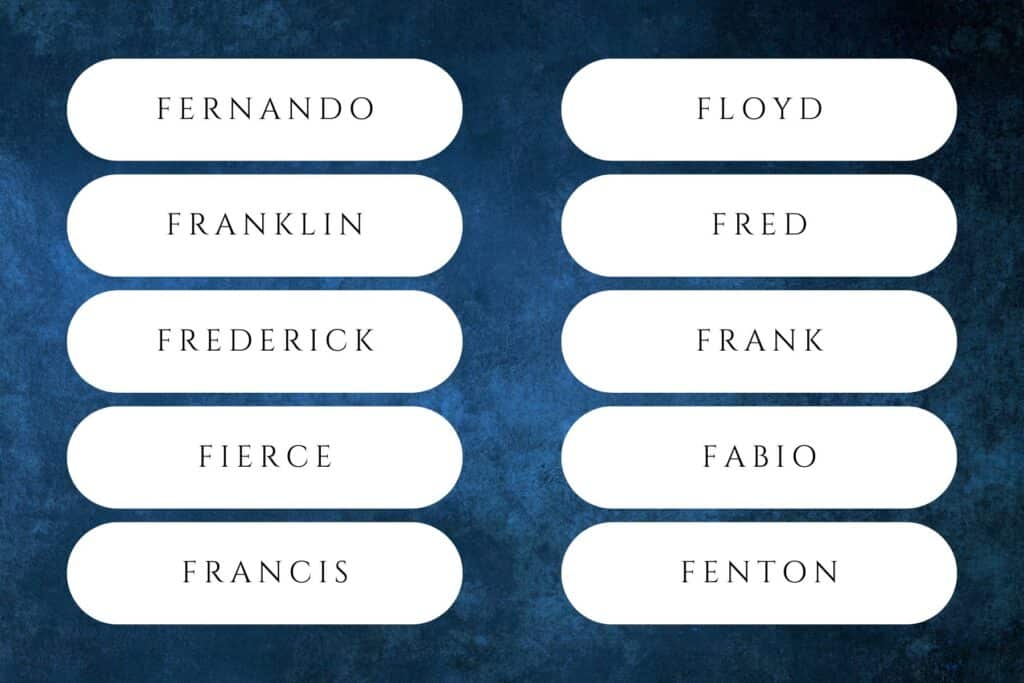
Fernando
Origin: Latin; Gothic
Meaning: Daring peace; Brave journey
Fernando, pronounced FUR-nan-doh, is the Spanish and Portuguese form of Ferdinand, which is composed of the Gothic elements friþus, meaning “peace,” or farþa, meaning “journey,” and nanþa, meaning “daring.”
Franklin
Origin: Middle English
Meaning: Freeman
Franklin, pronounced FRENK-lin, originated as an English surname derived from the word frankelin, meaning “freeman.” It used to be a popular name, but now parents prefer to use Frank or Frankie.
Frederick
Origin: German
Meaning: Peaceful ruler
Frederick, pronounced FRED-er-ik, comes from the German name Friedrich, which is composed of the Old German elements fridu, meaning “peace,” and rih, meaning “ruler” or “king.” Parents today prefer Freddie.
Fierce
Origin: English; French
Meaning: Violent; Frightening; Strong; Powerful
Fierce, pronounced FEERS, comes directly from the English word fierce, which derives from the Old French word fiers. In English, fierce means “physically violent and frightening” or “strong and powerful.”
Francis
Origin: English; Late Latin
Meaning: Frenchman; Spear tribe
Francis, pronounced FRAN-siss, is the Anglicized form of the Late Latin name Franciscus, meaning “Frenchman.” It’s ultimately derived from the Germanic tribe of Franks, known for the spear they used.
Floyd
Origin: English; Welsh
Meaning: Grey
Floyd, pronounced FLOYD, is a variant of the name Lloyd, which is derived from the Welsh word llwyd, meaning “grey.” It was popular in the early 1900s but is mostly relevant today due to Floyd Mayweather.
Fred
Origin: Old German
Meaning: Peaceful ruler; Peace to the king
Fred, pronounced FRED, diminutive of the German name Frederick, which is composed of the Old German elements fridu, meaning “peace,” and rih, meaning “ruler” or “king.” You can also go with Freddy.
Frank
Origin:
Meaning:
Frank, pronounced FRENK, comes from the name of the Germanic tribe known as the Franks, and Frances, the feminine form of Francis meaning “Frenchman” or “of French origin.” It’s similar to Frankie.
Fabio
Origin: Italian; Roman; Latin
Meaning: Little bean
Fabio, pronounced FAH-bee-oh, is the Italian and Spanish form of Fabius, which comes from a Roman name derived from the Latin word faba, meaning “bean.” Feminine forms include Fabia and Fabiola.
Fenton
Origin: Old English
Meaning: Marsh town
Fenton, pronounced FEN-tun or FEN-tihn, originated as an English surname believed to mean “marsh town” in Old English. There are several towns named Fenton in England, including one in Staffordshire.
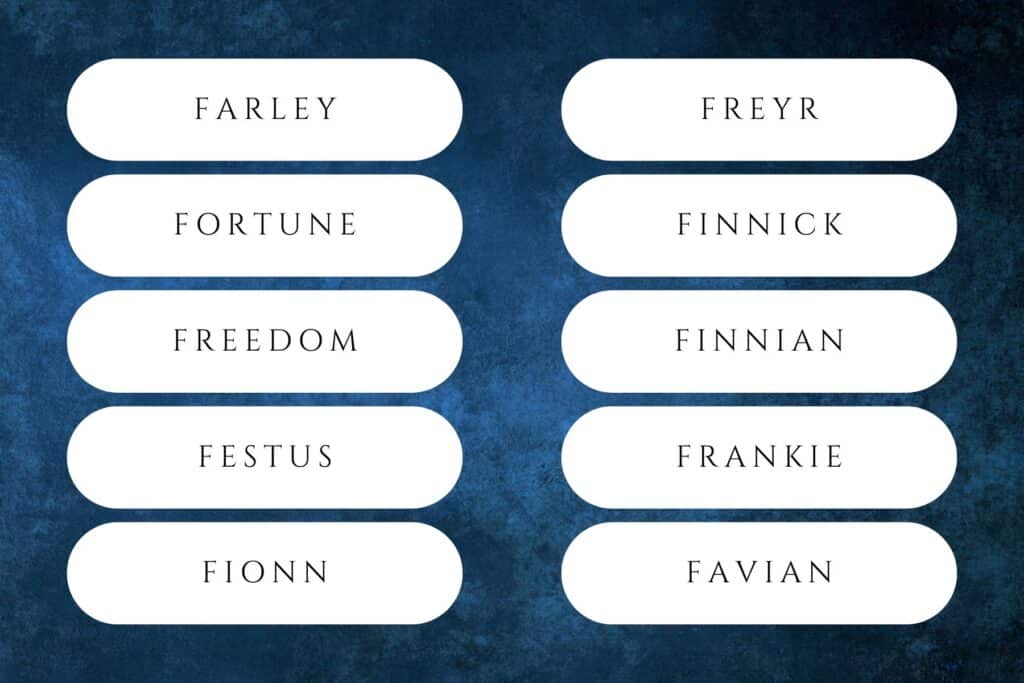
Farley
Origin: Old English
Meaning: Fern clearing
Farley, pronounced FAR-lee, originated as an English surname believed to mean “fern clearing” in Old English. It was the given name of Canadian author Farley Mowat and last name of comedian Chris Farley.
Fortune
Origin: English; French; Latin
Meaning: Chance; Luck; Wealthy
Fortune, pronounced FOR-chin, comes directly from the English word fortune, which derives from the French word fortune and Latin word fortuna. In English, it means “chance or luck” and “wealthy.”
Freedom
Origin: English
Meaning: Freedom; Free will
Freedom, pronounced FREE-dum, comes directly from the English word freedom (via Old English freodom), which refers to the quality or state of being free or “the absence of coercion or constraint.”
Festus
Origin: Roman; Latin
Meaning: Festival; Holiday
Festus, pronounced FES-tus or FES-tiss, comes from a Roman cognomen believed to mean “festival” or “holiday” in Latin. In the Bible, Festus was the Roman governor of Judea who succeeded Felix.
Fionn
Origin: Old Irish
Meaning: White; Blessed
Fionn, pronounced FIN, comes from the Old Irish word finn, meaning “white” or “blessed.” Fionn (Finn) mac Cumhaill is one of the most legendary heroes in Irish mythology. In English, we spell it Finn.
Freyr
Origin: Old Norse; Germanic
Meaning: Lord; Norse God
Freyr, pronounced FRAY-er or FRY-er, derives from the Germanic root fraujô, meaning “lord.” Freyr is a prominent god in Norse mythology associated with peace, fertility, prosperity, sunlight, and good harvests.
Finnick
Origin: Invented; Fictional
Meaning: “The Hunger Games” character
Finnick, pronounced FIN-ihk, was created by author Suzanne Collins for a character in “The Hunger Games.” He’s a resident of District 4 who won the 65th Hunger Games and is known for his good looks.
Finnian
Origin: Irish
Meaning: White; Blessed
Finnian, pronounced FIN-ee-ihn, is an elaborated form of Finn, which comes from the Old Irish word finn, meaning “white” or “blessed.” Fionn (Finn) mac Cumhaill is one of the most legendary heroes in Irish mythology.
Frankie
Origin: English; Germanic; Latin
Meaning: Germanic tribe; Of French origin
Frankie, pronounced FRANG-kee, is a diminutive of Frank, which comes from the name of the Germanic tribe known as the Franks, and Frances, the feminine form of Francis meaning “Frenchman” or “of French origin.”
Favian
Origin: Roman; Latin
Meaning: Bean
Favian, pronounced FAY-vee-ihn, is a variant of Fabian, which comes from the Roman names Fabianus and Fabius and is derived from the Latin word faba, meaning “bean.” You can also go with Favio.
Future
Origin: English; Latin
Meaning: Future; At a later time
Future, pronounced FYOO-cher, is another word name that comes directly from the English language. It derives from the Latin word futurus and means “at a later time” or “going to be” in English.
What Do You Think of Boy Names That Start With F?

Boy names that start with F have fallen out of favor in recent years, but that’s not always a bad thing.
In fact, that only means F names for boys are unique in today’s society — which means your son will likely be one of the only (if not the only) students in their classroom with that name.
But while F names deserve serious consideration, they represent just one letter of the alphabet.
With 25 other letters to explore, the perfect name for your little one could be waiting anywhere from A to Z — especially with each letter bringing its own collection of hidden treasures and overlooked classics.
Ready to explore all your options? Don’t worry — Mod Moms Club is here to help!
ALSO ON MOD MOMS CLUB: 60+ Boy Names That End in IE for Your Little Cutie Pie
With our baby name generator, parents can narrow down their list of baby names based on their personal preferences — and unlock baby names you’ve never heard or thought of. So, let the baby naming begin!












